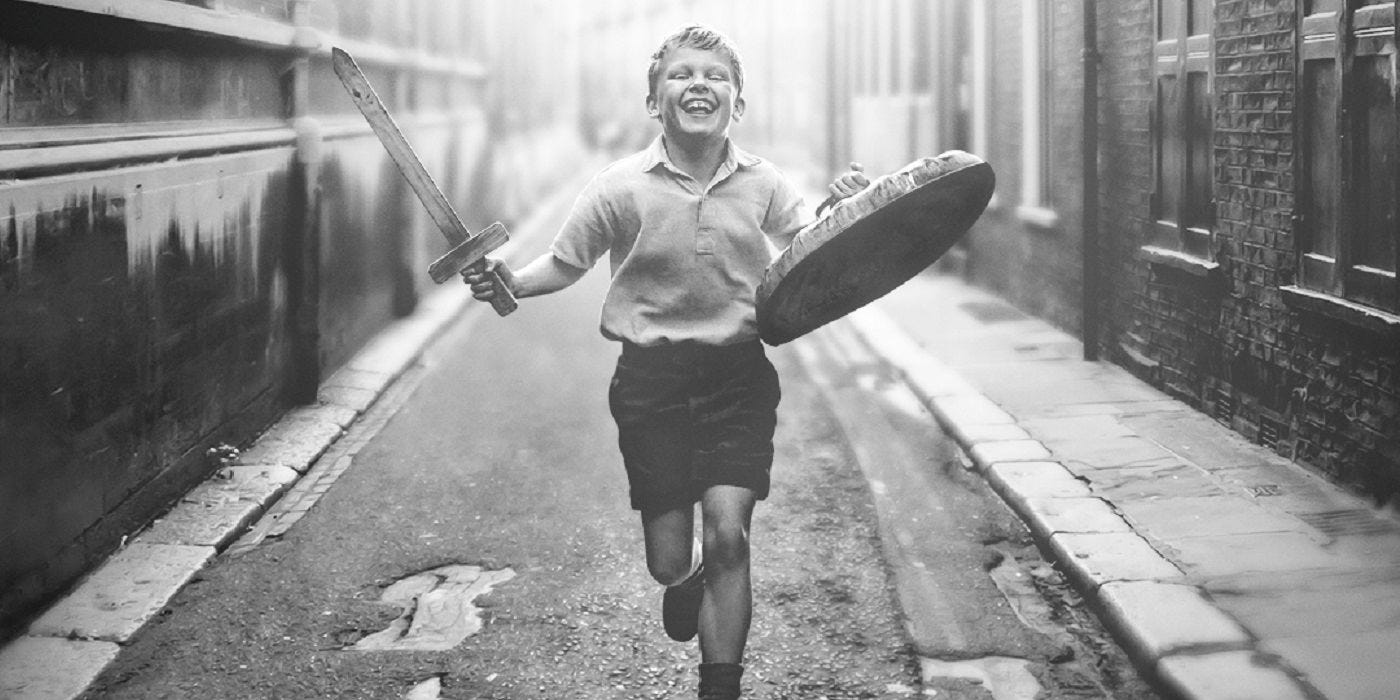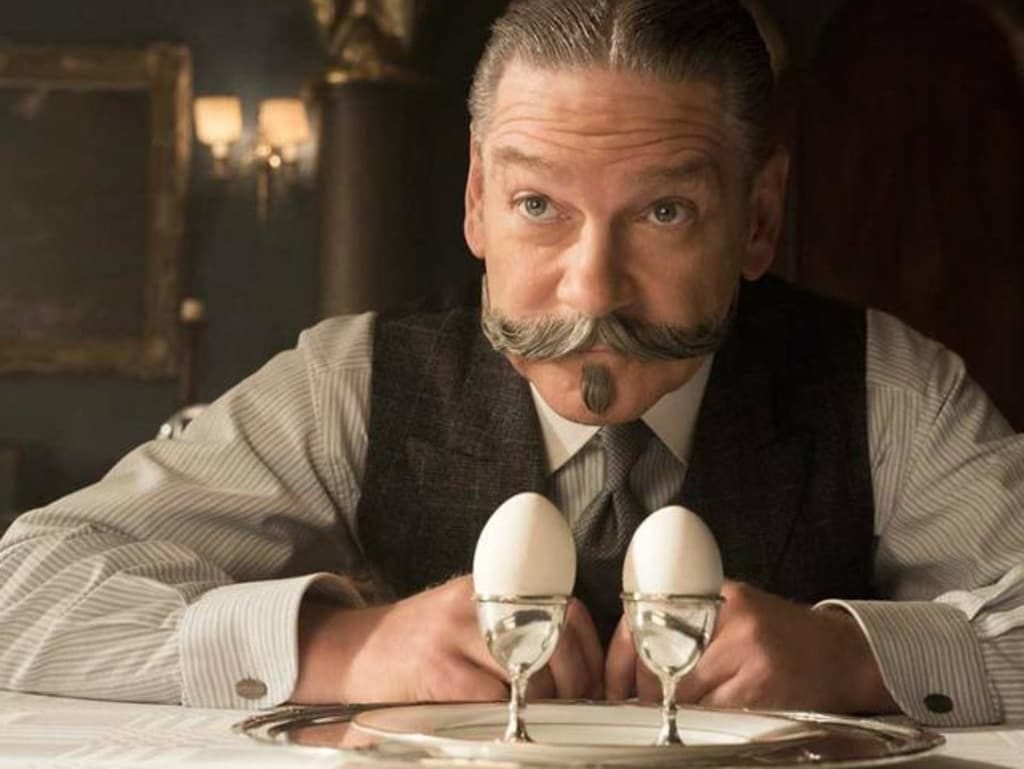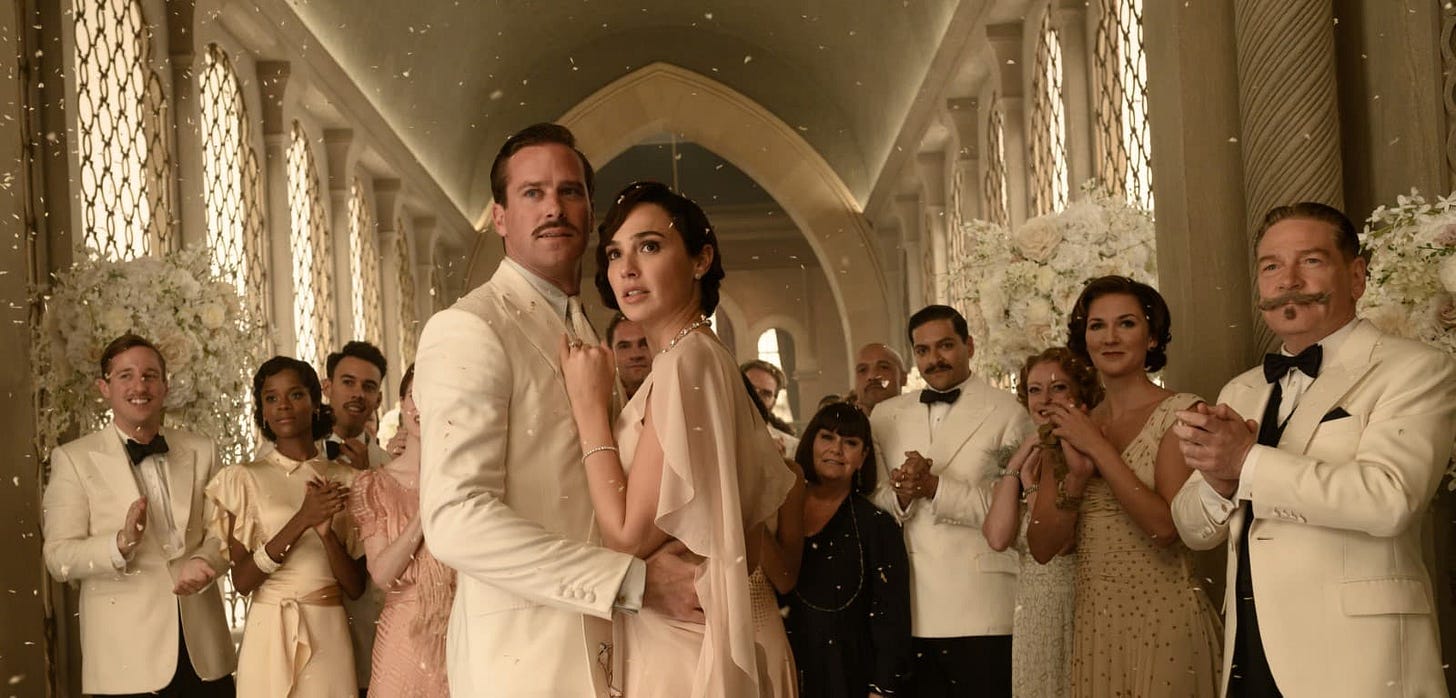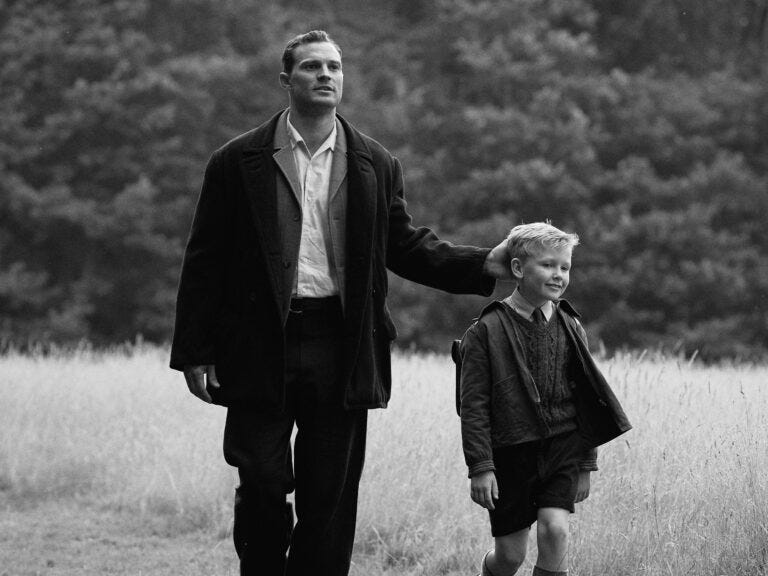Due to the exigencies of COVID, actor and director Kenneth Branagh has wound up with two movies in the theaters essentially back-to-back: Belfast, from last fall, and the just-released Death on the Nile. The first is a memory film about his childhood in Northern Ireland during the Troubles; the second, a sequel to his 2017 adaptation of Murder on the Orient Express. Branagh has two sides—one theatrical, the other commercial—and these films showcase both. Like his hero, Laurence Olivier (whom he played in My Week With Marilyn) Branagh began as a devotee of Shakespeare, becoming the greatest cinematic interpreter of the Bard in our time. His movies of the plays—made by the studio he founded, Renaissance Films—include his break-out coup, Henry V (1989), the sumptuous Much Ado About Nothing (1993), and his epic Hamlet, from 1996. The streak culminated in the 2006 HBO film As You Like It, a lyrical interpretation that set the play in Shogunate Japan. About that time, he moved into mainstream (i.e., American) projects. These comprise the mythic and tremendously entertaining Thor (2011); the deft, under-appreciated spy thriller Jack Ryan: Shadow Recruit from 2014; and an echanting adaptation of Cinderella (2015). His tastes are eclectic, and I appreciate that he refuses to repeat himself.
Still, he fell on his face a few times along the way. Love’s Labour’s Lost from 2000 tried to shoehorn musical comedy into the play; it didn’t work, but at least it was an intriguing conceptual failure, like Joe Wright’s misbegotten Anna Karenina (2013). I cut out of his 2007 film Sleuth after about twenty minutes. Even though it features Michael Caine and Jude Law going toe-to-toe, I couldn’t stand the Harold Pinter script, what with the writer’s bizarre speech patterns and cynical view of human nature. And Branagh’s 2018 picture All Is True is a truly strange affair: a portrayal of Shakespeare living in retirement in Stratford-upon-Avon that alternates between static shots of the Bard gardening and insufferable domestic melodrama. It posits Shakespeare still grieving his dead son, Hamnet; Branagh, playing the poet, is buried under prosthetics and facial hair that look laminated on his cranium. His Shakesepare is prosaic and tired—you struggle to connect the character to the spirit behind the greatest dramas in the English language.
He recovered with Disney’s Artemis Fowl (2020), a literal fairy tale that combines Irish lore, elements of Harry Potter (which makes sense since Branagh appeared in the HP films), and the suits and technology of Men in Black. This magical picture—fit for adults and kids alike—boasts a humorous, zestful script by playwright Conor McPherson and fun performances from Judi Dench, Josh Gad as a giant dwarf (no, really), Colin Farrell as the title character’s father, and Nonso Aronsie (also featured in Cinderella).
I. Death on the Nile
But before all that, Branagh scored another hit with his reinvention of Agatha Christie. Murder on the Orient Express was filmed in 65mm and it’s glorious. The director and designers bring to life the world of Christie’s most famous detective, the Belgian Hercule Poirot. Jerusalem, Istanbul, and the titular train glow with vibrancy, the crowd scenes lavish and sensory. Branagh captures the grand style of interwar civilization, and you get swept away from the first. The picture’s also perfectly cast, mixing Brits and Americans in the director’s usual approach. Willem Dafoe; Penelope Cruz; Leslie Odom, Jr; Olivia Coleman—where do you start? English actor Tom Bateman lends an irrepressible spirit to Bouc, Poirot’s friend. Johnny Depp is mercurial and oily as the gangster Cassetti. Derek Jacobi brings his classical theater pedigree to the role of Casetti’s valet. And those are just the headliners. Josh Gad; Daisy Ridley; Lucy Boynton; Manuel Garcia-Rulfo; and Sergei Polunin all deliver fine-tuned supporting performances. As Linda Arden and Princess Dragomiroff, respectively, Michelle Pheiffer and Dench have turns both arch and grand, evoking Garbo and other screen royals of the past. And then of course there’s Branagh as Poirot himself, sporting a much better (and bolder) mustache.
Branagh is an actor’s director—he specializes in drawing out performances attuned to whatever genre he’s in. Here he marries the setting of the mystery with an approach that recalls the studio era: he gives every actor a moment in the spotlight. As Poirot methodically works the case of Casetti’s death, the film allows each character to stand forth and make a distinct impression. Branagh’s Poirot stands in contrast to David Suchet’s long interpretation of the part. He brings his athleticism and vocal prowess to the part, rendering the detective physical, dynamic, and—dare I say—sexual. He’s funny, too, in a childish way. The material is not high art, nor the most sophisticated plot. But Branagh elevates it—watching the movie is like eating one of the decadent cakes Poirot indulges in.
Death on the Nile, on the other hand, is disappointing. The film retains the 65mm visuals and looks, like its prequel, gorgeous (the setting, of course, being Egypt). It starts out with a literal and emotional bang, a flash back to Poirot’s combat experience on the Western front during the Great War. Filmed in black-and-white, the harrowing sequence portrays the Belgian being ordered by his captain to advance with his unit on the enemy trenches. With his “little grey cells” at work, Poirot calculates that the company should attack immediately, rather than wait as instructed, so as to let poison gas conceal their approach. It works, but a booby trap kills the captain and mutilates Hercule. Tended by his fiancé, Katherine, he carries a broken spirit.
The plot leaps ahead to 1937 and finds Poirot in a nightclub, where he sees one Jackie de Bellefort (Emma Mackey) dancing sensually with her fiancé, Simon Doyle (Armie Hammer). When Bellefort’s childhood friend, heiress Lynn Ridgeway (Gal Gadot), arrives, Bellefort lets Doyle dance with her—only to witness an instant attraction develop. The narrative jumps ahead again several weeks to reveal Poirot in Egypt on holiday. There he encounters Bouc (Bateman again) and his mother, Euphemia (Annette Bennig) a painter. Bouc reintroduces him to Doyle and Ridgeway, who, to our surprise, have married and are honeymooning.
Yet they soon reveal to Poirot their distress—Bellefort, seized by jealousy, stalks them everywhere. To comfort themselves, they’ve brought along an entourage: Linnet’s maid, Louise Bourget (Rose Leslie); jazz singer Salome Otterbourne (Sophie Okonedo); Linnet’s old classmate and Salome’s niece, Rosalie (Letitia Wright); Linnet’s godmother, the socialist-socialite Marie Van Schuyler (Jennifer Saunders); Van Scuyler’s nurse, Mrs. Bowers (Dawn French); Linnet's cousin Andrew Katchadourian (Ali Fazal), who manages Linnet's will; and doctor Linus Windlesham (Russel Brand), who was engaged to Linnet before she left him for Doyle. Nevertheless, Bellefort shows up at the hotel they’re all staying in. To get away, the couple board a cruise ship and enlist Poirot to protect them.
Christie used this formula in many stories: get a bunch of loosely-connected people onto a train or boat or in a hotel, have one of them murdered, and let the plot eliminate the suspects one by one. The pleasure comes from trying to identify the killer before Poirot. Once again, Branagh’s assembled a strong cast. But they don’t deliver the knockout you get in the first movie. Bateman, as Bouc, again injects his joie de vivre into the proceedings. Okonedo is striking, as are Gadot, Mackey, and Hammer. Everyone looks stunning. Yet the supporting players never get their moment in the sun the way they did in Orient. Brand’s character isn’t developed much, for example, nor Fazal’s Katchadourian. Bennig is wasted as Bouc’s mother; she comes off as shrewish. You walk away without a sense for these people, their types not so indelible.
It also takes Branagh a while to get to the crime. By that point, you’re losing patience. You pay to see Poirot at work. But no sooner does he begin his investigation than it’s interrupted by contrived twists. There’s a heaviness to the proceedings that tires. With Orient, you were afforded the vicarious pleasure of interwar train travel—you felt like a first-class passenger. Here, you’re trapped on a ship with no life. Branagh’s camera work is dynamic and he composes beautiful images—pastels for the Egyptian sunset, the cast always placed in arresting formations. But there’s a lack of stakes that imbued moral weight to the precursor, and little suspense. When Poirot “solves” the mystery, it feels pulled out of a hat. As we left, my wife (who’s obsessed with Christie) observed that Branagh should’ve put Poirot on a case in London, where so many of the stories were set. We could have become familiar with his environs and seen his relationship with Arthur Hastings, his companion in detection. It’s a good idea.
II. Belfast
One’s environment is very much the theme of Belfast, which portrays the city in the late ‘60s. I have a confession: when I saw this movie last Thanksgiving, it did nothing for me. I found it erratic in mood, its conflicts oblique. But a friend gushed about it so much that I took a second look. This time, my heart warmed to it utterly. The picture’s told through the point of view of Buddy (Jude Hill), a nine-year old boy growing up in an Ulster Protestant family in the Northern Irish port. With his brother, Will (Lewis McAskey) he’s reared by Pa (Jamie Dornan) and Ma (Caitríona Balfe), along with his grandparents, Granny (Dench) and Pop (Ciarán Hinds). Filmed in black-and-white, the movie opens with a brutal riot by Protestants in Buddy’s neighborhood that seeks to drive out Catholics. It’s a visceral scene, the staccato camera work and audio mixing hitting you on all levels. When a car’s set on fire and explodes, you’re shaken. The residents erect a barricade and British security forces move in. But the stage has been set.
On my first viewing, I expected a more direct presentation of the Troubles. But that’s been done before, like in Jim Sheridan’s In the Name of the Father (1993) and Paul Greengrass’s docudrama Bloody Sunday (2002). Branagh instead tells a nostalgic tale from the perspective of a child. What I perceived as an inability to land on a mood is actually a wonderful mixture of comedy and drama that makes sense given its protagonist. Life goes on for kids, even amidst civil strife—full of fun, mischief, oddities. The narrative structure works asymmetrically, its rhythms bouncy, the shots rapid. This creates reality as experienced by a child, refracted in memory: non-linear, playful, drawn to imagination. Sensory stimuli hit the audience from all angles, as in the mind of a boy. The film seems to float and skate from one mood to the next. It’s unlike any other picture Branagh’s made, the cinematography and editing akin to the French New Wave.
The adult world lies at the periphery for much of the movie. Pa works as a joiner in England, absent for days; he’s in debt and trouble with the authorities for back taxes. On top of these financial straits, he receives a visit from Billy Clanton (Colin Morgan), a thuggish Ulsterman who demands he joins the cause. When Pa refuses, Clanton repeatedly pressures Buddy to make his father knuckle under. Given these stressors, Ma and Pa debate about whether to uproot and move—to Canada, Australia, London. But Belfast is a family story, akin to Sheridan’s In America (2002). It chronicles a similar tale of Irish emigration and deploys the same child’s eye for magic and whimsy. The grownup conflicts thus remain on the margins, and they strike the children as both inscrutable and absurd. This leads to humorous moments, such as when Buddy and a local girl named Moira (Lara McDonnell) try to sort out the Catholic families from the Protestants. She tells him that a Patrick or Sean is a Catholic, a Billy or Thomas a Protestant. When, in exasperation, he indicates a neighbor named Thomas who’s a Catholic, she remembers a cousin named Thomas who’s the opposite. They give up.
Meanwhile, Buddy—and the neighborhood—make joy for themselves amidst the chaos. His parents have a vivacious relationship, dancing in the streets during block parties and taking the kids to movies. Dornan and Balfe are great together, exuding chemistry. You can feel the attraction that drew this pair, still firing after many years and two kids. Even when they fight, you sense the sexual undertones. Branagh employs low angled shots much of the time, the world from the height of a nine-year old, which compliments the swirling camerawork he uses for the crowd scenes on the street. The cinema is a thrilling, escapist experience for the family, even clunky American sci-fi flicks and the ridiculous musical Chitty Chitty Bang Bang. Branagh puts these images in color to underscore their magical effects, and the family chirps the title song from the Dick Van Dyke classic, the ditty leaping into the soundtrack.
The director elicits a winning performance from Hill, who’s precocious and curious. Unlike other child actors I’ve seen of late (like in C’Mon, C’Mon), his character talks and behaves like a real boy. Buddy’s entranced by Star Trek and the moon landing, terrified by the fire-and-brimstone preaching of his minister. His chief concern, however, is winning the attention of a female classmate. This goal requires doing well enough in mathematics so that his teacher moves his desk up closer to the girl. Pop gives him homework tips—make your numbers look ambiguous enough to boost your score—and romantic advice. The latter involves lovely, touching exchanges with Granny, and the interplay between Hinds and Dench fills the picture with warmth. They convey the teasing, squabbling intimacy of grandparents, as seen through the eyes of their grandson. A somber saxophone and the pop songs of Van Morrison breath through the film, creating feelings by turns ebullient and elegiac.
The religious strife boils over, as we know it will. But Buddy’s parents will have no part of it. When Moira strong arms Buddy to join a gang that pilfers a supermarket during another, bigger riot, Ma drags the kids back to make them return the stolen goods. The first time I watched this, I couldn’t understand why a mother would haul her son into the middle of an insurrection. But on the second go around, I got her indignation and respected her refusal to let her child participate in mob actions. Yet even this violence is diluted by innocence. The final face-off between Pa and Billy is rendered through the eyes of Buddy—to him, the showdown is like the American Westerns he so enjoys.
The domestic drama dovetails with the political one, forcing the family to seek its fortunes abroad. Buddy screams at Christmas that he doesn’t want to leave Belfast, but his parents see little choice. As Buddy’s Aunt Violet (Josie Walker) points out to Ma, the Irish were born for leaving. And if they didn’t, how would the rest of the world have any pubs? And anyway, all the Irish need to feel at home is the sheet music to “Danny Boy,” she muses. Lest this become saccharine, Branagh has her launch in an ear-splitting rendition. “Violet, can I ask you a question?” jokes a neighbor named Mackie (Gerard Horan). “What did you do with the money your Ma gave you for singing lessons?”
When Buddy and his kin collect their possessions and board a bus, it evokes the devastating departure of Apu and his family in Pather Panchali (1955), Satyagit Ray’s first installment of his trilogy masterpiece. Granny, who must stay behind, offers a parting blessing that nearly breaks you (God bless Judi Dench). Branagh’s picture blends tones even more than Ray’s, as Buddy and his family exude that uncanny Irish instinct for finding the silver lining and switching from tragedy to laughter on a dime. Like his Indian counterpart, Branagh’s movie is an affirmation of the humanist spirit amidst a broken world. Pa refuses to let the stupidity of tribalism overwhelm his family. Buddy brings flowers to his crush as he leaves, and she reciprocates with a gift. When the boy admits to his father that she’s a Catholic, Pa responds with a declaration of human decency that struck me as sentimental last Thanksgiving. But now I find it exultant. Belfast is a tonic for the Troubles of our time.











